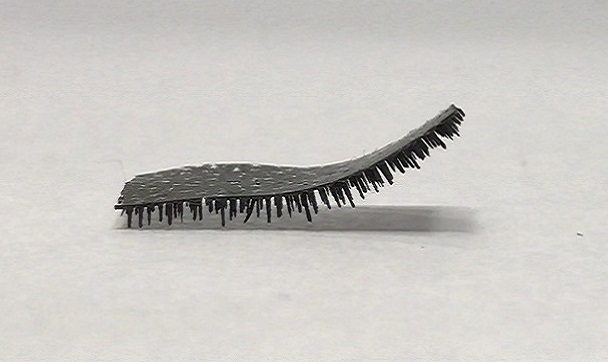
Researchers at City University of Hong Kong have developed a soft robot designed to guide medical imaging devices and deliver drugs inside the human body.
Called millirobot, the tiny structure is made with a silicon material called polydimethylsiloxane (PDMS). Equipped with hundreds of conical feet that measure less than 1 millimetre long, it is able to have great locomotive freedom as well as reduced friction. Measuring approximately 0.15 millimetres in thickness with the legs measuring 0.65 millimetres long, the gap between each leg measures at approximately 0.6 millimetres.
“Both the materials and the mutli-leg design greatly improve the robot’s hydrophobic property. And the rubbery piece is soft and can be cut easily to form robots of various shapes and sizes for different applications,” said Professor Wang Zuankai from CityU’s Department of Mechanical Engineering. “The rugged surface and changing texture of different tissues in the human body make transportation challenging. Our multi-legged robot shows an impressive performance in various terrains and thus has great potential for drug delivery in the body.”
Implanted with magnetic particles, the robot is connected to a remote-controlled magnetic manipulator that enables it to use both magnetic torque as well as pulling force as sources to steer the robot. This leads to an improved adaptability to the variety of surroundings found within the human body. Moving forward by swinging its body, it is also able to use its front feet to progress its movement onward in a flap propulsion pattern.
Being extremely flexible and able to bend its body up to 90 degrees, its carrying load is that of 100 times its own weight, comparable to the carrying capacity and strength of an ant. Bearing this weight, millirobot is able to move at a pace of 8 mm in 45 seconds.
“The amazingly strong carrying capability, efficient locomotion and excellent obstacle-crossing ability make the milli-robot extremely suitable for applications in a harsh environment, such as delivering a drug to a designated spot through the digestive system, or carrying out a medical inspection,” said Dr Shen Yajing, an assistant professor from CityU’s Department of Biomedical Engineering.
The researchers from City University are now focusing on advancing and refining their research by adding new features, studying different shapes, and finding a biodegradable material that will naturally decompose upon delivering intended medicines in the body. Their aim is to create a biodegradable version of the millirobot within the next two to three years.
To read more about the millirobot, click the link below.





